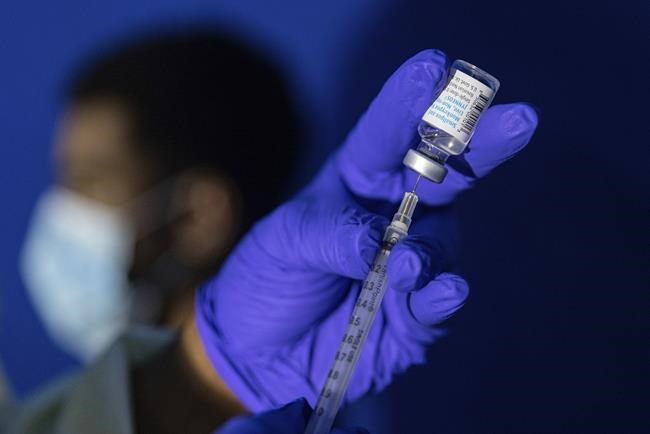
<p>A family nurse practitioner prepares a syringe with the mpox vaccine for inoculating a patient at a vaccination site in the Brooklyn borough of New York, on Tuesday, Aug. 30, 2022. THE CANADIAN PRESS/AP-Jeenah Moon</p>
Republished August 14, 2024 - 3:03 PM
Original Publication Date August 14, 2024 - 12:01 PM
The World Health Organization's declaration of mpox as a global public health emergency means Canada must do its part to help stem outbreaks of the virus in Africa, experts say.
"Where there is a fire, we all put it out quickly and the whole village is safe. If you allow one house to burn in a village, sooner or later that fire is coming for you," said Dr. Madhukar Pai, Canada Research Chair in epidemiology and global health at McGill University in Montreal.
The WHO's declaration on Wednesday comes as mpox — formerly known as monkeypox — has surged in Congo and emerged in neighbouring Burundi, Kenya, Rwanda and Uganda, none of which have had reported cases of the virus before.
Other African countries have had outbreaks of different clades — or types — of mpox. An emergency committee of independent experts told WHO's director-general they were concerned about the "potential to spread further across countries in Africa and possibly outside the continent," a news release said.
Although the current risk in Canada is low, the declaration of an international emergency is a signal for all countries to report their own cases of mpox, as well as share resources to help the Africa Centres for Disease Control and Prevention bring the outbreaks under control, Pai said in an interview.
"What we should do .. is to instantaneously band with other Global North countries — U.S.,U.K., Europe — (and) come up with a package of money, resources, vaccines, medicines, tests, whatever is required for Africa CDC to get ahead of this pandemic before it becomes a genuine global threat,” said Pai.
Doing so is not only being a "good global citizen," but also the best way to prevent mpox from travelling and becoming a bigger threat in Canada, he said.
”We cannot afford another global epidemic. And this is a time to act -- not when it's too late and suddenly it's in Montreal. It's in Toronto... Then going into a frenzy trying to get ahead of it. We will spend millions more fighting it here rather than helping Africa right now,” said Pai.
Jason Kindrachuk, Canada Research Chair in emerging and re-emerging viruses at the University of Manitoba, agreed.
”Viruses and emerging infectious diseases don't respect international borders and don't carry passports," he said in an interview.
"As we let these things move more broadly through communities and through countries ... the greater the risk comes for further spread, you know, to our own country," he said.
Kindrachuk also noted the financial consequences for Canada, as well as other countries, if they fail to respond quickly.
"Every time that these outbreaks escalate to a point where there is a public health emergency, either at a local level or at a global level that's announced, there's a massive economic and resource toll that has to be undertaken to try and get things contained at that point.”
One of the main reasons for declaring an international emergency, the WHO said, is the emergence of a new mpox strain, called clade Ib, which is spreading rapidly and appears to cause more serious illness.
There have been no cases of clade I cases in Canada, the Public Health Agency of Canada said in an emailed statement on Wednesday.
"PHAC is closely monitoring the increase in clade I mpox cases in the DRC (Congo) and neighbouring regions and liaising with partners and subject matter experts to update risk assessments, public health guidance and travel health advice as appropriate," the agency said.
The agency is also monitoring an increase in clade II mpox cases in Ontario, it said.
Clade II mpox is the milder form of the virus that appeared in Canada during an outbreak in 2022.
This report by The Canadian Press was first published Aug.14, 2024.
Canadian Press health coverage receives support through a partnership with the Canadian Medical Association. CP is solely responsible for this content.
News from © The Canadian Press, 2024